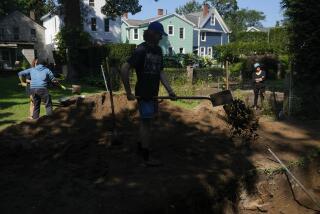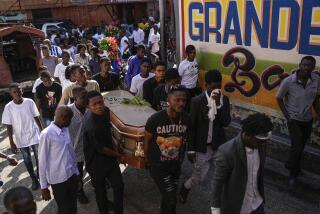Embittered Township Buries Massacre Victims : South Africa: Funeral for those slain in Boipatong is a scene from nation’s strife-torn past.
- Share via
BOIPATONG, South Africa — People of this embittered township, packed shoulder to shoulder in their ragged thousands, bid a tearful farewell Monday to 37 sons and daughters slain in a massacre that has driven South Africa into a deepening crisis.
The six-hour funeral, on a wind-swept soccer field here, was a scene out of South Africa’s strife-torn past. As yellow police helicopters patrolled overhead, black leaders and robed pastors accused the government of complicity in the killings, declared their impatience with the pace of apartheid reform and called for a month of countrywide protests.
Family members wept over the long line of caskets, and a few mourners collapsed and were helped away. A strong young man, grief written on his face, carried a coffin containing the body of his 9-month-old son from a hearse.
Names of the “martyrs,” as the massacre victims were called, were handwritten in ink on tin plates atop the caskets--brown for adults, white for children. One read: “Julia Lata. Died: 17-6-92. Aged: 12 years. Rest in Peace.”
“We pray, we pray for goodness’ sake, God, that this will be the last time,” said Anglican Archbishop Desmond Tutu, winner of the 1984 Nobel Peace Prize.
Tutu, dressed in a purple tunic and cap, called on President Frederik W. de Klerk to apologize for the sins of apartheid, assuring him that blacks would forgive him. And he asked blacks to show restraint.
“We as black people need to look at ourselves,” Tutu said. “How come we can agree to be used? How can a black person take an AK-47 (assault rifle) and kill people? What is happening to us?
“We hate violence from whatever quarter,” Tutu added, leading the crowd in chants of “We want peace. We want peace.”
But Tutu’s calming words did little to discourage the growing anger of young blacks in this region, known as the Vaal Triangle, one of the areas hardest hit by township violence. And the spiral of violence seemed out of the control of both black and white leaders in the country.
Shortly before Tutu spoke, a mob outside the stadium coldly stabbed a young black man they accused of being a supporter of the Inkatha Freedom Party, which the township blames for the Boipatong massacre.
As the man lay mortally wounded, angry youths fired bullets into his writhing body. Later, the mob “necklaced” the man, putting a tire around his neck, dousing him in gasoline and setting him afire.
Police say the June 17 massacre of more than 40 men, women and children here was carried out by about 200 supporters of Inkatha who live in a nearby hostel for migrant workers. Hostel residents suggest that the massacre was revenge for the killing of one of the residents’ girlfriends by township youths.
Inkatha, rival of the African National Congress, has close links with the government, and witnesses said they saw policemen supporting the Boipatong attackers. The government denies the accusations and says it is conducting a complete investigation. So far, six men have been arrested.
The crowd of about 25,000 mourners grew silent as Simon Moloi, 35, recounted the night. He and his wife, Elizabeth, who was eight months pregnant, were awakened by the shooting outside.
They saw two black men and two white men with guns, and the couple fled. When they came to a fence, though, Moloi said, his wife could not go on.
“Don’t leave me behind,” she pleaded with her husband.
“What can I do?” he remembered saying. She hid behind a shack, and he ran into a field.
When Moloi returned, he found his wife’s body beneath a blanket. She had been stabbed to death.
Speaker after speaker called for more militant action against De Klerk, and leaders of the Vaal Triangle ordered an worker strike and consumer boycott.
Some mourners carried ANC posters reading: “De Klerk--Murderer. Assassin. Thief. Go Now!” A leaflet distributed by the ANC referred to “more blood on De Klerk’s hands.”
“We are sick and tired of burying our people,” declared Jay Naidoo, general secretary of the powerful, 1-million-member Congress of South African Trade Unions.
“De Klerk has declared war on the people of South Africa,” Naidoo said. And he led mourners in a chant: “De Klerk must go! De Klerk must go!”
Later, blacks thronged the streets as the funeral procession left the stadium and moved to the treeless cemetery in next-door Sharpeville, scene of the 1960 killing of 67 black protesters by police.
As the hearses drove past Monday, angry youths brandished sticks and rifles, taunting white journalists with the slogan of the radical Pan-Africanist Congress: “One settler. One bullet.” A British journalist was slightly injured when he was struck on the head with an iron bar.
Cyril Ramaphosa, ANC secretary general, said the ANC had high hopes for the future in February, 1990, when De Klerk released Nelson Mandela from jail and legalized black opposition parties.
But now, he said, “De Klerk cannot escape responsibility for the carnage in our country.” And he predicted that the Boipatong massacre “will be a signpost that leads us to our freedom.”
Although the ANC has broken off talks with the government over the massacre, Ramaphosa said his organization has not given up hope on negotiations.
“We are still determined to see it through,” he said. But, Ramaphosa added, if De Klerk does not make “meaningful progress” to meet the ANC’s demands, “the chances of the ANC returning to the negotiating table are virtually nil.”
More to Read
Sign up for Essential California
The most important California stories and recommendations in your inbox every morning.
You may occasionally receive promotional content from the Los Angeles Times.














